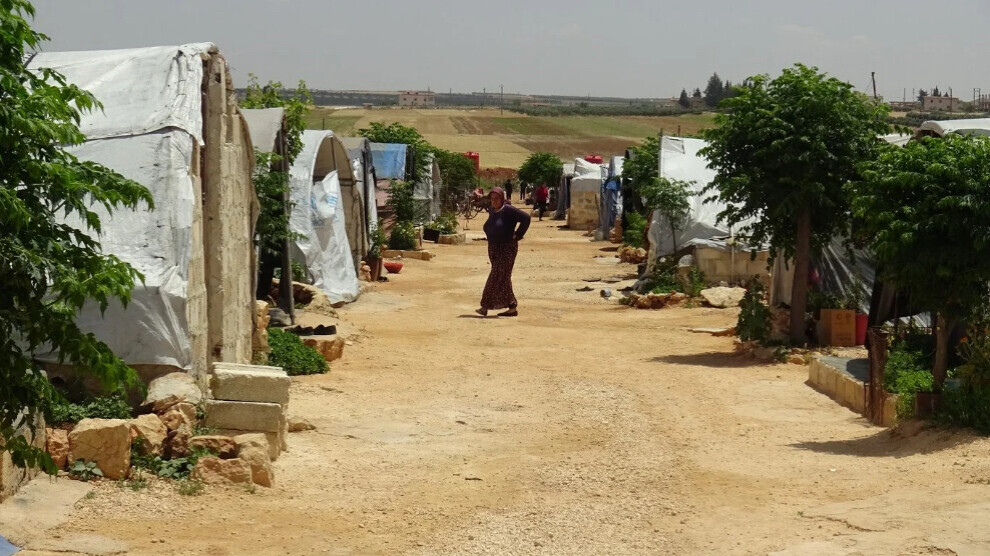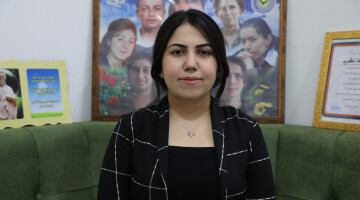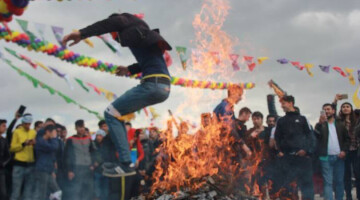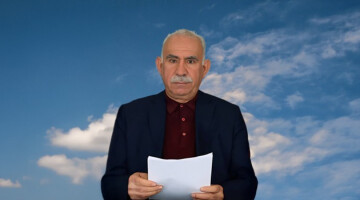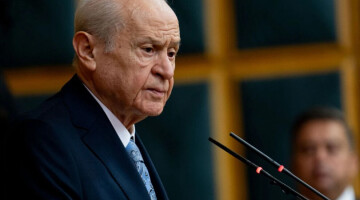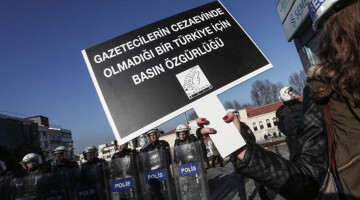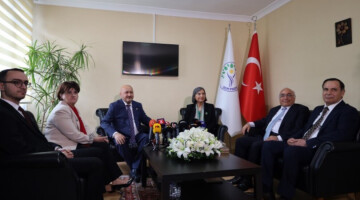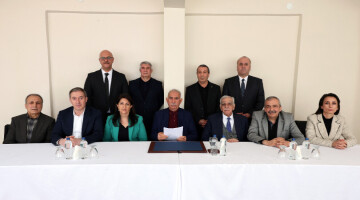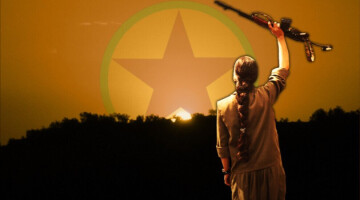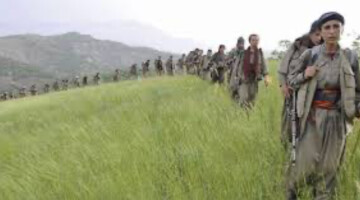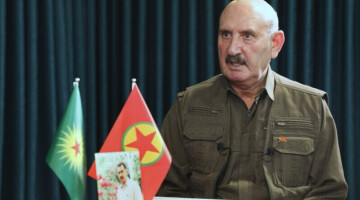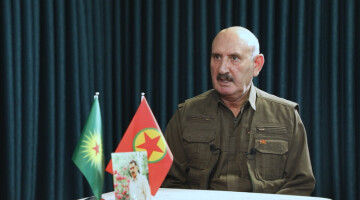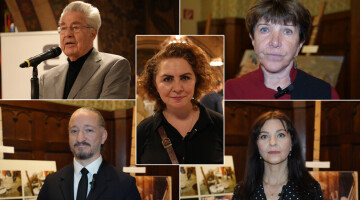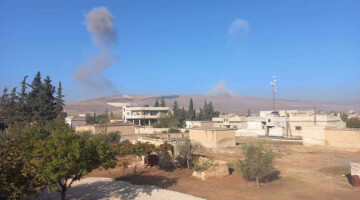Following the military operations launched by the occupying Turkish state—which escalated into a full-scale occupation in 2016— the cities of al-Bab, Azaz, and Jarablus were invaded, followed by the occupation of Afrin (Efrîn) in 2018, Girê Spî and Serêkaniyê in 2019, and finally Manbij (Minbic) in 2024. The people who were forcibly displaced from their lands due to the occupation have continued to call for an end to Turkey’s attacks, particularly after the fall of the Baath regime on December 8, 2024. The demand for a safe return of the displaced population was also included in the terms of the agreement signed on March 10 between General Commander of the Syrian Democratic Forces (SDF), Mazloum Abdi, and Syrian Interim President Ahmed Al-Sharaa.
Îbrahîm Sheikho of the Syria-Afrin Human Rights Organization, Shîrîn Reşît from Afrin, and lawyer Ciwan Îso, a member of the Serêkaniyê Migrants Committee, spoke to ANF and shared details regarding the human rights violations committed by armed groups in the occupied areas.
One of the eight points in the agreement signed between the SDF and the Syrian government focuses on the return of people forcibly displaced from their lands. Commenting on this matter, Îbrahîm Sheikho said: “While discussions continue regarding the return of our displaced citizens to their lands, it is of great importance that this return happens in a safe manner. The responsibility lies with the Syrian Interim Government, because during his visit to Afrin, its President stated that the people of Afrin would be able to return safely. However, many questions remain unanswered—how this return will take place, how security will be ensured, and whether or not the occupiers will be held accountable.”
No safe return for local residents unless Turkish-backed mercenaries withdraw
Îbrahîm Sheikho emphasized that without the withdrawal of the Turkish state and affiliated mercenaries from the occupied areas, the obstacles to a safe return would not be removed. He continued: “Practices such as abduction, murder, and torture continue in the occupied regions. The Turkish state and its mercenaries have still not withdrawn from these areas. With each passing day, genocidal policies grow more severe. The Turkish state and its mercenaries must immediately withdraw from the occupied territories. While torture by these groups continues, we recently learned that a civilian was shot in the leg simply for raising the flag of Kurdistan during a Newroz celebration.
Additionally, a civilian in Rajo district was subjected to violence for possessing a Kurdistan flag, and in Kurzele, a village in Sherawa (Şêrawa), four civilians were attacked for raising the flag. If the Kurdish people are subjected to violence even during celebrations of a holiday which they hold sacred and claim, how can a safe return to the occupied lands be possible? Is it possible to live under the control of those who deny your existence, your identity, and your culture? For this reason, unless these groups are withdrawn, a safe return for the people will not be possible.”
Sheikho underlined that international human rights and security institutions and organizations also bear responsibility for ensuring a safe return. He concluded: “These institutions must engage directly with the peoples whose lands have been occupied, monitor the occupied regions, and fulfill their responsibility to ensure the withdrawal of these armed groups. The return of communities subjected to occupation must be ensured without delay. Our people have been displaced for years. Even now, those forcibly displaced are still being targeted by attacks. Both international institutions and the Syrian Interim Government must urgently fulfill their duties and responsibilities. They must ensure the removal of the Turkish state and its mercenaries from the occupied regions and open safe corridors to allow the people to return to their homes.”
Human rights violations continue
Shîrîn Reşît from Afrin, who was displaced from home and settled in Shehba in 2018 and then forced to flee from Shehba on December 2, 2024, stated the following: “There is widespread chaos and a deep crisis across Syria. After the fall of the Baath regime, which denied and sought to destroy the existence, identity, and culture of the Kurdish people for years, the people of Afrin, as well those from Serêkaniyê, Girê Spî, and other displaced communities throughout Syria, are calling for one thing: a safe return to their lands. Along with that, we want to live a stable and peaceful life in our country, on our land and in our homes. One of our fundamental demands is for peoples to live freely and together. However, when we look at the decisions and practices of the Syrian Interim Government, we see clearly that the demands of the peoples of Syria are not being fulfilled. People are still being killed and tortured because of their beliefs. It is unrealistic to expect such a government to ensure the safe return of the forcibly displaced population.
Those who present themselves as representatives of the Syrian government must act to prevent massacres, violence, and attacks, but they remain silent. They must break their silence and take a clear stand against these practices. To create a secure environment in Syria, the occupation must first come to an end, and the safe return of the forcibly displaced must be ensured. Of course, that alone is not enough. Those who have committed crimes must be held accountable. The Kurdish people and all those forcibly displaced from their lands are fulfilling their duties and responsibilities. They are in a constant struggle against the Turkish state and its mercenaries. And they will never give up their struggle.”
Ending the occupation is not enough; those responsible must face justice
Referring to the regions occupied by the Turkish state since 2016, lawyer Ciwan Îso stated: “From al-Bab to Azaz, Afrin, Serêkaniyê, and Girê Spî, there are numerous violations in the occupied regions—in humanitarian, legal, and security aspects. Inhumane practices and severe rights violations are taking place. Massacres, demographic engineering, torture, and abductions continue. Through illegitimate institutions and entities, the Turkish state is carrying out a policy of genocide in the occupied areas. The Syrian people hoped that the fall of the Baath regime would bring transformation and change. But the reality that emerged was not just a continuation of the past—it has become even worse. The occupied territories pose a threat to the safety and stability of neighboring regions as well. We are at a time when the safe return of displaced populations is being discussed. However, none of the expected changes have been implemented. So far, the Turkish state has not withdrawn from the occupied areas. For a safe return to be possible, the occupying forces must withdraw.”
Îso also criticized international powers visiting Damascus for not prioritizing the situation of the displaced. He continued: “Numerous people displaced from cities across Syria have returned to their homes. But the people of Afrin, Serêkaniyê, and Girê Spî—those living under Turkish occupation—have not been able to return. The main obstacles are the Turkish state and the affiliated mercenaries. The people are fully aware that their safety will be in danger. As long as these occupiers remain in the homes of the people, who can guarantee a safe return? The central issue in Syria today is ensuring the safe return of those who were forcibly displaced. Therefore, Turkey’s occupation policy in Syria must be brought to an end.”
Îso stressed that conditions are favorable for the return of the IDPs: “First and foremost, the policy of occupation must end. The occupying forces must withdraw from the lands of the people. If a return is to take place, security must be guaranteed. It must happen under the supervision of international human rights institutions. Ensuring the safety of the people must be the top priority. War crimes are being committed in the occupied areas. These groups must be held accountable for the crimes they have committed. It is not enough for them to simply leave these territories. Material and moral support must also be provided to the displaced. None of the conditions we have outlined have been implemented. Under these circumstances, a return is not possible. Because without these conditions being met, the safety of the people will remain at risk.”
What happened in Serêkaniyê over the past five years?
- 87% of the population of Serêkaniyê was forcibly displaced.
- Only 45 Kurdish residents remained in the city—mostly elderly people and children.
- Approximately 6,000 homes belonging to civilians were occupied.
- Around 1,700 shops and businesses were seized.
- Nearly 3,000 families who are not originally from Serêkaniyê were settled in the city.
- About 75 families affiliated with the Islamic State (ISIS) were settled in the Zorava neighborhood.
- Five villages were partially destroyed; the village of Ain Hissan was completely demolished and turned into a military training center.
- Sixty villagers were expelled from their homes.
- Eleven women, including five children, were raped.
- Around 1,112 people were abducted, imprisoned, killed, or subjected to torture.
- Around 120 instances of internal conflict were experienced.
- More than 15 people were killed at the Turkish border.
- 72 explosions occurred.
- The fate of 72 civilians remains unknown.
- 23 groups—mostly armed factions—are involved in human trafficking.
- Mercenaries turned three villages into centers for drug cultivation.
What happened in Afrin over the past seven years?
- The largest demographic change since the start of the Syrian conflict in 2011 took place in Afrin. More than 300,000 residents of the city were displaced. After the occupation, the Kurdish population in Afrin decreased by 25%.
- Over 700,000 people from outside the region—including from countries and areas affected by war and conflict—were resettled across all villages and districts of Afrin. Among them, more than 500 families were brought from Palestine. Due to their high numbers, approximately 47 colonial housing complexes were constructed specifically for these families.
- The Turkish state continued its policy of Turkification against the people of Afrin. It attempted to implement this by changing the names of neighborhoods, public squares, and hospitals. Turkish flags were placed in schools, and the names of public spaces were altered—Newroz Square was renamed Salah El-Din Square and later removed entirely.
- More than 47 colonial housing complexes, including Kuwait al-Rahma, Qaryat al-Shamiya, and Qaryat Besma, were established. All of these settlements were built by organizations with ties to Qatar and Turkey, including the Beyan Organization, the Palestinian Ayesha Organization, and the Ihsan Organization.
- In addition to changing place names, Turkish was made compulsory in schools, and students were forced to wear uniforms bearing the Turkish flag.
- 64 schools were demolished, and around 50,000 students were deprived of education. Many of these schools were converted into military bases, detention centers, and torture facilities.
- The name of Avrîn Hospital, which had been written in Kurdish and Arabic, was changed to only Turkish. All street signs and banners were also replaced with Turkish-language versions. All Yazidi sacred sites and cemeteries were destroyed.
- In all areas under Turkish occupation, the Turkish state issued Turkish identity cards to Syrian citizens. The use of the Syrian lira was banned, and the use of the Turkish lira was imposed. Telephone networks were also replaced, making the use of Turkish networks mandatory. In addition to abductions, killings, torture, and rape carried out by Turkish forces and allied mercenaries, civilians were also subjected to extortion, forced displacement from Afrin, and various other forms of abuse.
- In the eight years of occupation, more than 10,208 civilians were abducted. Fifteen percent of them are still missing, while thousands were released only after their families paid ransom. This method has effectively become a source of income for the mercenaries.
- A total of 105 women were killed, 74 were raped, and 14 committed suicide. More than 1,000 women were abducted and subjected to daily torture, harassment, and sexual violence.
- Over 778 civilians were killed. Among them, 682 died as a result of artillery attacks carried out by the Turkish state and mercenaries, while 96 were tortured to death. More than 762 people were injured by Turkish shelling, including 345 children and 225 women.
- Over one million olive trees were cut down for commercial purposes. More than 30,000 olive trees were exported. Additionally, 75% of cultivated lands—approximately 12,000 hectares—were burned. Thousands of civilian homes were seized, and many of them were turned into prisons or military centers run by Turkish-backed militias.
- Olives and olive oil were confiscated from the local people and smuggled into Turkey through a gate opened in 2019 in the village of Hamam, in the Jindires district. These products are sold in global markets as if they were produced in Turkey.
- Numerous cultural heritage sites included onto UNESCO World Heritage List, such as Ain Dara, Nabi Huri, Duderiyê Cave, and the Shrine of Mar Maron, were destroyed. According to the Afrin Archaeology Committee, there were approximately 75 historical sites in the city. The Turkish state and mercenaries deliberately excavated and demolished ancient hills and mounds. More than 59 historical sites and over 28 religious monuments were damaged—one of which was even turned into a livestock market.
- Over 10,000 homes and 7,000 shops were seized by the Turkish state and mercenaries and these figures apply only to the Afrin city center.
- The Turkish state and its mercenaries did not stop there. IDPs from Afrin who settled in Shehba after the occupation were subjected to daily brutal attacks by Turkish forces. Due to intensified attacks on Shehba by Turkish-backed groups, the people of Afrin were once again forced to flee—this time from the Afrin-Shehba Canton to other regions in North and East Syria on December 2, 2024.

